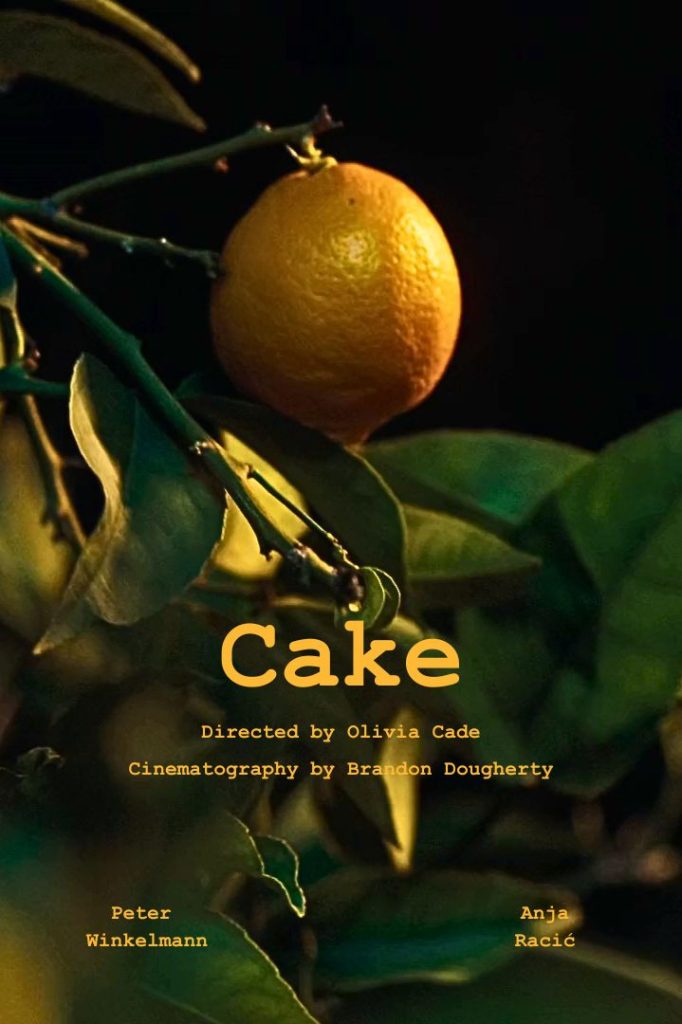A woman writes her suicide note. A neighbour tries to bake a cake. Their worlds collide over a thin apartment wall in Cake, a quietly poignant short film written and directed by Olivia Cade.

Annabelle, played with haunting stillness by Anja Racic, is introduced at her lowest moment. She types out a farewell message, calmly explaining that she has taken her own life and has left enough money in a drawer to cover funeral expenses. It is a shocking yet measured opening that tells us everything about her state of mind. This is a woman who is not acting out, but following a plan.
The plan is interrupted by loud cartoon music from the next apartment. When she knocks on the door to complain, she meets Jack, played by Peter Winkelmann. He is tearful, apologetic, and completely absorbed in a failing attempt to bake a vanilla cake for his late mother’s birthday. It is her first birthday since passing away, and Jack, desperate to honour her memory, is making a mess of it.
Despite herself, Annabelle gets involved. After a second confrontation with Jack over the noise of his crying, she ends up in his kitchen, sleeves rolled up, helping him get the cake right. They are strangers, both living quiet lives behind thin walls, and now they are making a cake together. It is absurd. It is also touching.

What follows is a gentle and surprising connection. As they mix the batter and talk, Annabelle begins to open up, slowly and cautiously. They need a lemon for the recipe and step outside to find one, marking the first time we see these characters break out of their personal spaces and move through the world together. That simple walk, in search of an ordinary piece of fruit, becomes the emotional pivot of the story.
Cade’s direction is subtle but assured. There are no grand gestures or sweeping reveals. The focus stays on these two people and their tentative, growing bond. It is a short film that allows silence to speak, and it never underestimates the power of a small act of kindness.
The cinematography by Brandon Dougherty gives the apartment setting a sense of intimacy without feeling confined. The framing is thoughtful, keeping us close to the characters without being intrusive. There is a quiet rhythm to the way the scenes are cut together, thanks to Cade’s own editing work, which keeps the film grounded in character and emotion.
Sound plays a key role in the storytelling. From the cartoon music that interrupts Annabelle’s plan to the quiet clatter of kitchen utensils, everything serves the emotional beats. The sound department, including Alex Bologna and Alexis Tran, deserve credit for using sound not just as atmosphere but as narrative device.

With a reported budget of only four hundred dollars, Cake is a shining example of what can be done with strong writing, good performances, and a clear vision. This is not a film that hides behind its limitations. Instead, it embraces its simplicity, focusing on what matters most — two people, one moment, and a sliver of human connection when it matters the most.
There are no sweeping statements or sentimental finales here. Instead, Cake quietly reminds us that the smallest human interactions can carry the greatest emotional weight. Sometimes, a conversation in a kitchen or a walk to a lemon tree can pull someone back from the edge.
The supporting crew, including producers Anja Racic and Peter Winkelmann, have clearly put their trust in Cade’s vision. The presence of a small team, such as production assistants Paige Baskin, Lola Darzens, Jud Grubbs, and Alex Winkelmann, shows the kind of close collaboration that gives independent films their authenticity.
In the end, Cake is not about sugar or sweetness. It is about grief, loneliness, and the unexpected ways that people can save each other. This is a small film with a big heart, and one that deserves to be seen.
| Acting | |
| Direction | |
| Cinematography | |
| Writing | |
| Sound | |
| Screen Critix Rating |

